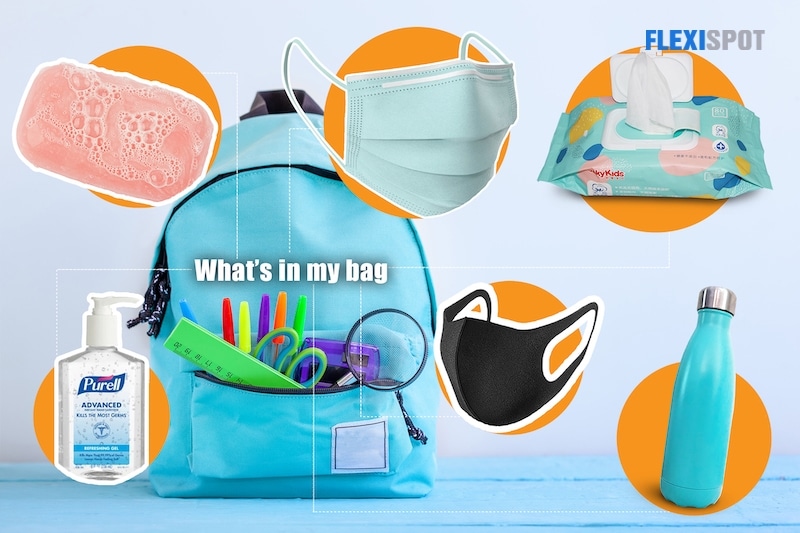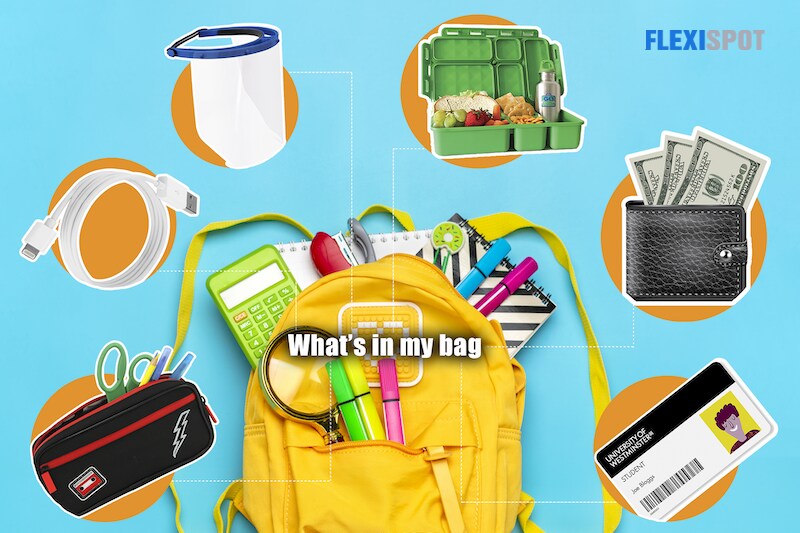There is a thrill in the air as the start of a new school year approaches. A fresh start and the hope of new experiences mingle with the joy of catching up with friends and exchanging summer memories. By this point, your child's backpack is stuffed with every pencil, folder, and binder they'll need to succeed in school. However, in addition to ballpoint pens and crayons, packing their backpack with a few health needs will keep your children healthy and safe all year.
Many students will soon return to school for face-to-face education. Several states have reinstated their indoor mask rule, and the Centers for Disease Control and Prevention's guideline for vaccinated people is still changing. However, the school rules and supplies appear to be very different from a few years ago. As a prophylactic step, some schools urge or even require children to wear masks. Even though most teachers include hand sanitizer and disinfectant wipes on the school supply checklist, these things are more vital than ever to fight against the virus.
Some students across the country may be attending school on a staggered timetable. Others may be enrolled in hybrid classes, which combine in-person classroom instruction with online study from home. Many teachers and parents are concerned about the reopening of schools during COVID-19. While everyone wants to do the best for our children and teachers, the practicalities required to maintain everyone's safety do not appear feasible without compromising educational quality.
The new varieties of the virus are a solid excuse to purchase more supplies than your list requires. There will most likely be less sharing, greater social separation, and school policies to prevent the transmission of the virus. In the meantime, students returning to in-person learning should add a few levels of defense and protection against the virus. We've learned a lot about the coronavirus and have a deeper understanding of safeguarding ourselves and the people around us. If your child is returning to school this year, here are some items you should have on hand.
Hand Sanitizer
According to the CDC, send your children to school with hand sanitizer with at least 60% alcohol. In the absence of water and soap, your children should use an alcohol-based hand sanitizer. The multitude of germs your child will get in contact with during the day is astounding. Running to the restroom to wash your hands is not always a possibility, especially before lunch. Bringing a small bottle of hand sanitizer on hand will urge your child to bomb those germs and stave against the inevitable illness that will spread across the school.
Tissue and/or Disinfecting Wipes
Send your children to school with tissues and/or disinfecting wipes to keep them from wandering across the classroom more often than needed. Your child will come into contact with at least a dozen surfaces at school, ranging from tabletops to computers, so it's a good idea to keep some disinfecting wipes in their backpack just in case. These are especially crucial for frequently handled surfaces such as door handles, handrails, seats, switches, and buttons. Tissues are useful for allergies, and wipes can clean hands, fingers, or spills and touch everyday items. Remind your child to wipe down the bus seats before they take a seat. Sending some in for the educator to have in the classroom is also a good idea.
Cloth Masks
Wearing a mask is now known to be the most effective means of preventing the transmission of COVID19. And they wouldn't have to be hospital-grade to be effective; according to a study, even cloth masks are effective. As many school districts require children to wear them, ensure that your child has at least two cotton masks so they may alternate them while one is being washed. Allowing small kids to choose their own mask will make them more enthusiastic about wearing it.
Disposable Masks
If your child forgets their cloth mask at home, it's a good thing to give them a pack full of disposable masks to carry in their backpack. Because there's a risk they'll lose their cover, get it soiled, or tear it; you'll want to ensure they're constantly prepared with a pack of spares. These do not have to be surgical—there are many disposable masks designed for other types of employees accessible online.
Reusable Water Bottle
Having a refillable water container will train your child to drink plenty of water, whether after gym class or during the day. Water has numerous advantages, the most important of which are enhanced brain activity and vitality, essential for a good school day. A self-cleaning bottle is an excellent alternative for your teenagers to bring to school every day. Choose a motivational water bottle for your primary and middle school-aged children to urge them to drink their water.
Travel Soap
Hand soap reigns supreme when it comes to cleansing hands. While sanitizer is an excellent backup, you can think about sending your child to school with some soap in a portable container to use if the school's bathroom is out of soap.
Personal Information Card
This is crucial in the event of an emergency or if your child gets lost. Having it laminated will protect it from damages. The following details should be included on the card:
- Full name:
- Home address:
- Phone number in case of emergency:
- Chronic illnesses:
- Medication they are taking:
- Any severe allergies:
Charger
A backup charger kept in a backpack will provide you and your child with some peace of mind. You won't have to think about them becoming disconnected and unable to reach you if their cell phone runs out of battery power before sports practice. If they don't need it, chances are a friend will, and you'll be pleased you have a spare.
Face Shield
Think about sending your child to school with a face shield if you'd like to explore the idea of a face mask up another notch, since information says that they are superior to a regular surgical mask or cotton mask, especially for children and teachers. Face shields improve visibility, are comfier than face masks, and provide significant protective eyewear. Simultaneously, they provide equal or better protection against droplet contamination.
Lunch Bag/Box
Are you contemplating whether you should buy lunch at school or bring your own from home? A decent lunchbox may help make that decision easier, and it is also useful for carrying snacks to keep your child's energy levels up throughout the day. Insulated bags are great for keeping meals warm or cold, and they also keep things from leaking in a backpack.
Extra School Supplies
Grabbing pencils or other objects is not encouraged since it breaches the physical barrier between two students or between a child and an adult. It's important to send your children to school with spare paper, glue, pencils, and other supplies they'll need every day.
Emergency Money
It's a good idea to have a little extra money on hand in case of an emergency. Dependent on your child's age, this might be anything from cash for a forgotten lunch to gas money for when your teen realizes they failed to fill up their tank. While children should not be accustomed to carrying significant amounts of cash, keeping a little emergency stash on hand can benefit.
Start At Home and Be Proactive
Cleanliness and hygiene are at the center of the campaign to prevent the spread of the coronavirus. Handwashing, sanitizing, disinfecting, and ensuring physical distance are all important considerations for schools, teachers, and parents. However, as schools reopen, parents must be actively committed in their approach. In addition to masks, equip your children with sanitizing equipment and educate them on how and when to use them. Teach children how to use wipes and clean their desks and chairs even before school starts. Make an effort to provide them with personal hygiene kits and teach them how to utilize them.


